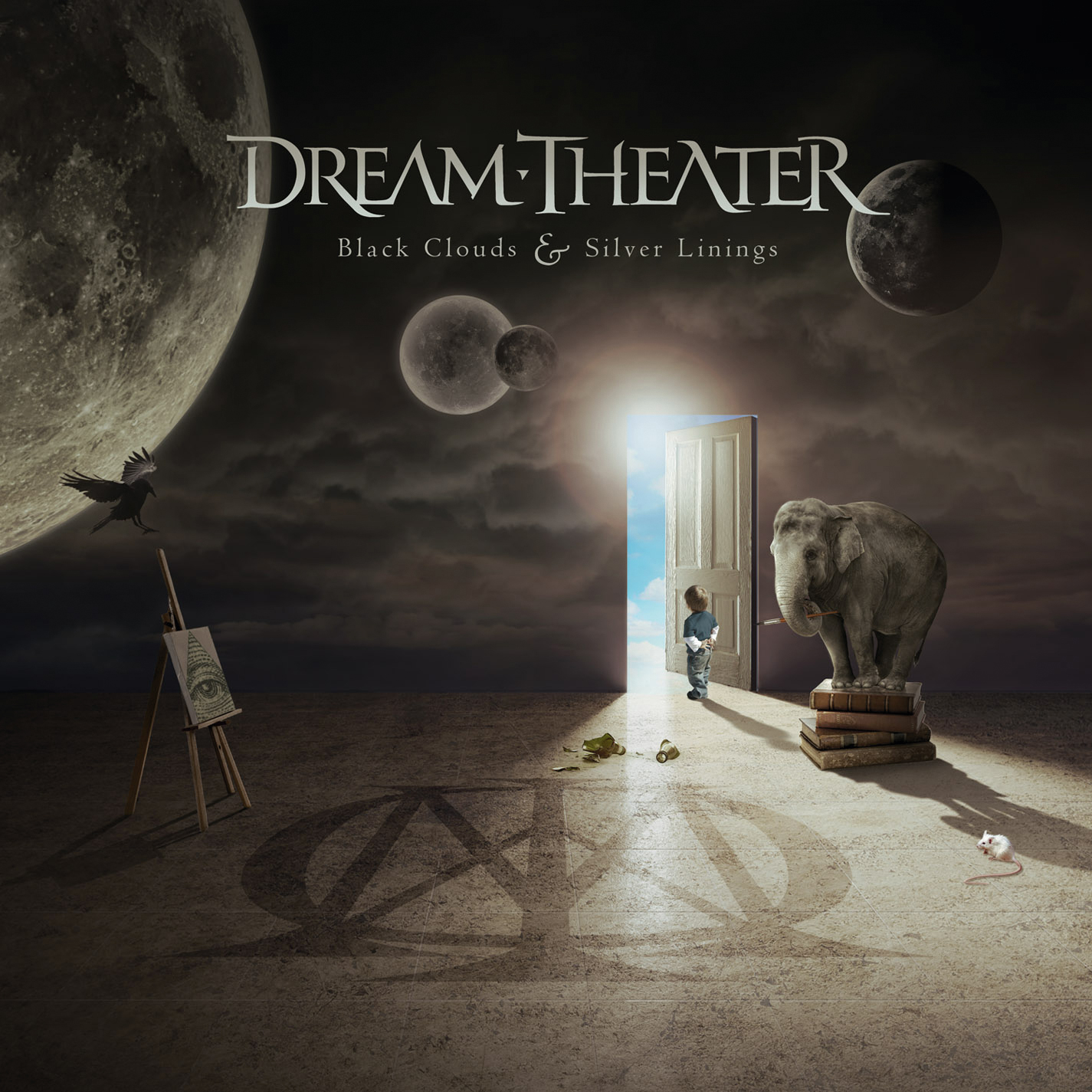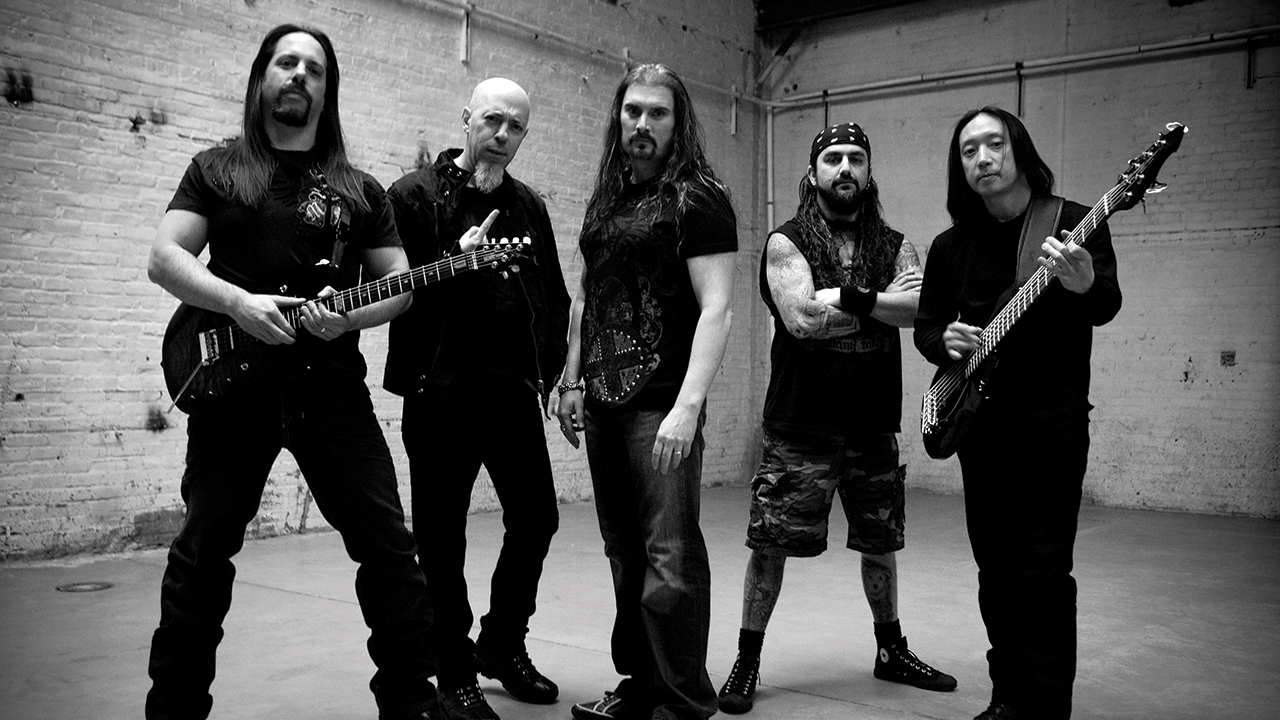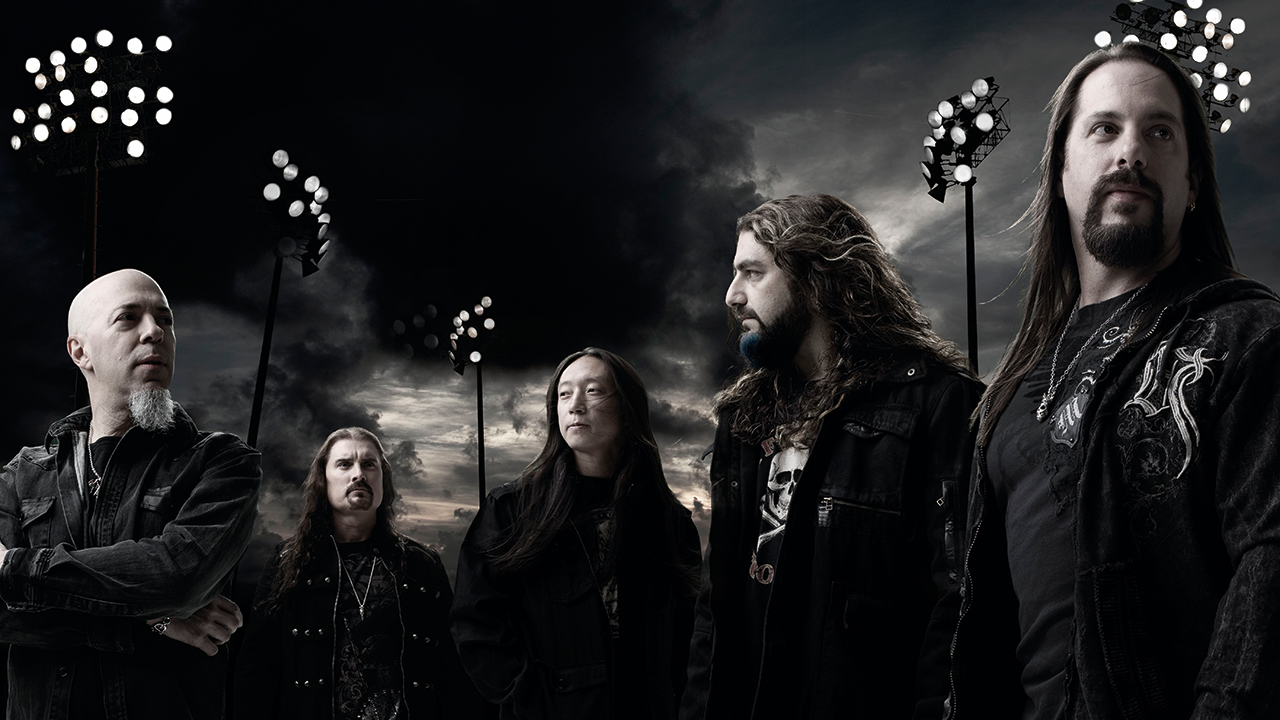Back in 200-9, in the very second issue of Prog Magazine, Editor Jerry Ewing sat down with Mike Portny to discuss the state of the prog nation and Dream Thetser's tenth studio album Black Clouds & Silver Linings, the last DT album Portnoy featured on until the band's upcoming next release in 2024!
“That’s what the word progressive is all about, if you look at the genre it covers extreme metal from the likes of Mastodon and Opeth all the way to Radiohead, Porcupine Tree and Oceansize. The term progressive in a nutshell is about the range and diversity. Right now I think progressive music is at its highest productivity level since the early 70s.”
Mike Portnoy reclines on a West London hotel sofa and nods, as if agreeing with his own statement. Prog certainly concurs with him. It’s one of the main reasons we exist. As are Dream Theater, the one band who have flown the progressive flag on a mainstream level for the past 20-odd years while the genre seemingly awoke from an enforced hibernation and has slowly but surely developed, like a beautiful butterfly slowly emerging from its chrysalis. A state of affairs for which, while not singularly responsible, Portnoy and his fellow bandmates can at least take a large slice of credit for.
“I bet there were a lot of cynics who saw this magazine and said ‘How the hell are they gonna do this?’,” he continues, warming to his theme and hoisting aloft a copy of issue one of Prog, which he admits to having spent the entire flight over from America digesting. “But they don’t realise that it’s not just about Genesis, it’s about everything.
“Ten years ago people were afraid of the term progressive. When OK Computer came out Radiohead shunned the description. Even Porcupine Tree a few years ago were scared of it. I don’t think bands are scared of it anymore, they’re embracing it. It’s flattering. It’s not necessarily a style of music, but rather a state of mind. Of going against the grain and doing what the hell you want. Mastodon’s Crack The Skye is a perfect example. A band can come out and do an album of 10-minute songs and it’s no longer shunned and criticised but applauded.”
Fortuitous timing for all concerned then it would seem. Not least Dream Theater, who are on the verge of releasing their tenth studio album, the hugely impressive Black Clouds & Silver Linings. Six (yes, just six) tracks of Dream Theater at their most exploratory and expansive.
“When we formed in 1985 there was no prog,” Portnoy continues. “Maybe Marillion. There was a prog scene in England but not in America. Really the only prog that we were going on was the stuff from the 70s – Yes, Genesis, Floyd, and Rush. So we were still in the void. It didn’t matter that it had been killed off by punk, or the fashions, we just dug the music.
“And also at the same time we were into metal. We dug Sabbath and Priest and Maiden and at that point Metallica was coming around. But by the time Dream Theater broke, around about ’92, there was nothing there. It was all grunge; Nirvana, Jane’s Addiction, Stone Temple Pilots and Pearl Jam. It was all about not playing and prog was probably as unfashionable as it was in the late 70s when punk killed it for the first time. We stuck out like a sore thumb.”

Hindsight might, perhaps, suggest that it was this very fact that helped define Dream Theater in a market that really only offered up bands like Watchtower and Fates Warning as competitors. That and the arrival in the Dream Theater world of then-Kerrang! and current Prog writer Derek Oliver, the man who would sign Dream Theater to Atco following their original deal with Mechanic/MCA, for whom they recorded 1989’s When Dream And Day Unite. Ironically the same Oliver would be instrumental in the band signing to Roadrunner Records in 2007.
“When Dream And Day Unite was a very underground album and we probably would have stayed alongside Watchtower and Fates Warning had it stayed that way,” Portnoy considers. “But Derek Oliver was writing for Kerrang! and he liked that album. He left Kerrang! to come to America to get involved in the music industry, and he signed us for Images And Words. I think somebody taking a chance on us and the genre as a whole in 1992 took a lot of balls. It’s one thing for us to be playing this music but another for a record company guy to sign it and put it on a major label.
“But once Images And Words broke it suddenly opened up a whole new world and a whole new generation. Finally there was a progressive metal band in the mainstream. And 15 years later, maybe there are some bands we’ve spawned, but we certainly opened the door for some bands to gain mainstream acceptance.”
It is interesting to hear Portnoy talk about prog as a state of mind. This was, for many years, a typical way of describing prog’s supposed antithesis, punk rock, that now cumbersome, aged beast which failed to kill of what it professed to hate (but as we all know secretly loved). He has a point. Today prog does seem to be a state of mind. A factor which was no doubt helped by the fact that, during its fallow years, many bands, stared at blankly by non-understanding eyes from the labels to whom they were signed, created their own cottage industry to allow their careers to continue. And how DIY punk is that?
While this approach, pioneered by the likes of IQ and Pendragon (to name but two) is today carried onwards by labels like Marillion’s Racket set-up, with the failure of the major label conglomerates to understand almost anything beyond what Simon Cowell tells them to, smaller labels have steadily grown in stature who understand exactly what to do with progressive music.
“InsideOut are one of the best progressive labels who have allowed the scene to develop and grow,” states Portnoy. “Most of my favourite bands are on the label. Spock’s Beard, The Flower Kings, Pain Of Salvation, Oceansize, Beardfish. All down the line I think Inside Out and Thomas Waber have been integral to the development of the prog scene. And because I’ve always been a fan of these bands I’ve always gone out of my way to take these bands out on tour. Because InsideOut give these band’s tour support to go out on the road and support Dream Theater.”
And then, of course, there is Dream Theater’s own label, Roadrunner Records, a label Portnoy credits with the renewed sense of vigour that can be heard all over 2007’s Systematic Chaos and Black Clouds & Silver Linings.
“They have us and Opeth and Porcupine Tree. They’re another label who really cares about their artists and gives them space. With both our albums that we’ve recorded for them, they didn’t hear a note of music until we gave it to them. And that’s the way it should be. Then they get behind it and give it the marketing and the exposure that it needs to exist and flourish.”

All of which has resulted in an album that Portnoy described to the press as “a Dream Theater album with A Change Of Seasons, Octavarium, Learning To Live, Pull Me Under and The Glass Prison on”. A bold statement? Maybe, until you’ve heard the band cut loose on the set of epic prog metal that makes up Black Clouds & Silver Linings.
“We always try to go for it, always try to have that relentless ride. The next rollercoaster,” he smiles.
Clearly the band are relishing the sense of freedom afforded them by Roadrunner. Despite four of the six tracks clocking in at well over 12 minutes (closer The Count Of Tuscany is pushing nearly 20 minutes), the band are capable of restraint yet still delivering in a manner that will have DT fans frothing at the prospect of the new album.
“It’s easy because we’re left alone,” he smiles. “Me and John [Petrucci, guitarist] produced this record and I’ll call all the shots in terms of marketing and when we go on the road and when we put it out. That freedom is incredible and it’s the only way a true prog band can function. We’ve had this freedom for about the last 10 years.
“It’s been well documented and anyone who knows our career will know there was a period in the late 90s where we were at a standstill. The industry basically had us in handcuffs and it basically broke up the band. The only way we were able to get our freedom and independence back was to break up. We had to say to the label ‘We’re packing it in unless you get out of our hair and walk away’ and luckily the label we were with realised they’d be losing a hell of a lot of money.
“We were a band for whom they just put albums out and made money without having to put anything into it. That was the period where we regained our independence and had to prove ourselves. When we made …Scenes From A Memory [1999] we had a lot to prove. We had to prove to the fans, to get them back after the commercial approach and we had to prove to the label that we could produce our own music. And that album was a success on every level. Critically, commercially, the fans loved it. So thank God that album succeeded and that opened the door for all the other albums we’ve been able to make ‘on our own’.”
There’s no doubting that Dream Theater do sound like a rejuvenated band.
“We’ve come full circle,” he laughs. “It’s been two decades and here we are working Derek Oliver again. It’s crazy, but it’s the way it should be.”
Another sense of closure on the new record is the completion, in the three-part The Shattered Fortress, of Portnoy’s Twelve-step Suite, the musical journey concerning him tackling his alcoholism, that began with The Glass Prison on 2002’s Six Degrees Of Inner Turbulence.
“Finally finished,” he smiles, feigning exhaustion. “The whole process in itself has been very therapeutic which is why I wanted to write about these 12 steps that have changed my life. When I started it with The Glass Prison which was steps one, two and three I thought it was an ambitious project. I’d never heard of anyone write a concept piece that would spread over five albums and five interconnecting but different songs. A unique and ambitious idea but at the time I didn’t realise the hole I would dig myself into. So it’s been like a homework assignment hanging over my head every album. And now I’m happy to be done with it.
“But it’s been a cool thing to do and get out of our system and I feel this last chapter is a great finale. When we wrote it we looked back at the past four and brought back themes and riffs and melodies. And that’s true prog, that’s how concept albums are written, bringing back themes and concepts. But this was a case of crawling from album to album – seven years, five albums, ha ha. But it’s nice to be done with it finally. And it’ll be fun to play live.

And let it not be said that Dream Theater do not have fun in the live arena, often destroying the oft-held convention that all prog bands are po-faced musos (this of course, despite DT’s dextrous abilities).
“Definitely,” he nods. “When you see us live I think we’re more in tune with Metallica than Rush. It’s all about the energy and interaction and the audience feeling the power. We’re not Iron Maiden up there but it’s a more metal environment. Then again, I sometimes wonder whether we’re sometimes too metal for the prog purists and too prog for the metalheads. Sometimes it hurts us, but in the end, if there are people who love everything then there’s something they can find.
“My tastes run from ABBA to Slayer. I know there are people in the world who like a lot of things. Dream Theater has toured with Yes and they’ve toured with Megadeth and we can fit into both worlds. If you only like one thing, prog or metal, then maybe Dream Theater may be too extreme for you, but if you like all sorts of things, then there’ll be something for you to get into in Dream Theater.”
Surely, given the expansive umbrella that is prog these days, a pre-requisite for being a fan of progressive music?
“I had people talking on my message board about the best albums of this decade,” Portnoy notes. “And it was astonishing the level and the quality of the albums that have come out. Bands like Porcupine Tree, The Mars Volta, Opeth, Muse, Mastodon… And someone said it was like the golden age of prog all over again.”
Which is, I think, where we came in. Only before the PR has a chance to bring the interview to a halt, Portnoy raises his hand, almost like a schoolboy asking to be excused for a toilet break.
“You’ve got to let me talk about Progressive Nation,” he insists.
And we’re off again. Most Dream Theater fans will be aware of Progressive Nation, the Portnoy-inspired touring festival that helps push progressive bands in both America and Europe. In 2008 Dream Theater took a bill consisting of Opeth, Between The Buried And Me and 3 around America. This year they entertain Zappa Plays Zappa, Beardfish and Pain Of Salvation. They then venture over to Europe, taking in some festival appearances (including Download) and entertain European audiences with a bill that features Opeth, Bigelf and Unexpect.
“Some of these bands, like The Flower Kings, they tour Europe, but it’s impossible for them to tour America,” he explains. “Pain Of Salvation have never done a proper US tour. Neither have Beardfish. That’s one of the main reasons I invited them on the US version. And Bigelf can’t get over to the UK.
“And it’s important for me to share our audience with these bands, but also to share these bands with our audience. I came up with Progressive Nation to allow us to have a festival that gives exposure to great bands to a great audience.”
He really must be like a kid in a candy store.
“Totally. I have a list of about 30 bands that I love and I want to help and share and stand on the side of the stage and watch. It’s great.
As we shake hands and say goodbye, one final thought occurs. Does Mike Portnoy ever stop working?
“No,” he laughs. “Never. I haven’t found the ‘off’ switch yet. It’s a good thing for the fans. Maybe not such a good thing for my family, but good for the fans.”

